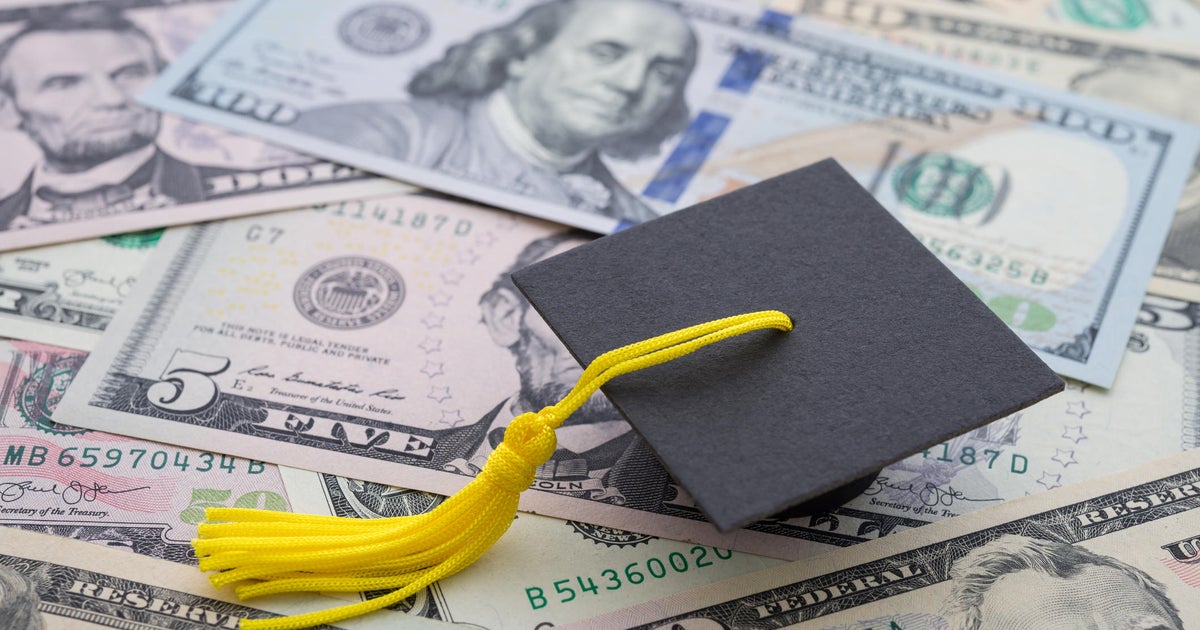CBS News
More Americans say college just isn’t worth it, survey finds

Americans are increasingly skeptical about the value and cost of college, with most saying they feel the U.S. higher education system is headed in the “wrong direction,” according to a new poll.
Overall, only 36% of adults say they have a “great deal” or “quite a lot” of confidence in higher education, according to the report released Monday by Gallup and the Lumina Foundation. That confidence level has declined steadily from 57% in 2015.
Some of the same opinions have been reflected in declining enrollment as colleges contend with the effects of the student debt crisis, concerns about the high cost of tuition and political debates over how they teach about race and other topics.
Whether a college educations is required to achieve professional success is also up for debate, as only about 1 in 4 Americans say a bachelor’s degree is necessary to secure a well-paying job, according to a March survey from the Pew Research Center.
Employment opportunities and earnings for young men without college degrees have improved in the last decade, reversing some of the economic damage that eroded the group’s fortunes starting in the 1970s. Young men with only a high school degree have seen a slight rebound in their earnings since 2014, Pew found.
The median annual income for men 25- to 34-years-old without a college degree was $45,000 in 2023, a 15% increase from $39,300 in 2014 when adjusted for inflation, according to Pew’s analysis of Census data.
Dimming belief in college
But the dimming view of whether college is worth the time and money extends across all demographics, including gender, age and political affiliation. Among Republicans, the number of respondents with high confidence in higher education has dropped 36 percentage points over the last decade — far more than it dropped for Democrats or independents.
“It’s so expensive, and I don’t think colleges are teaching people what they need to get a job,” said Randy Hill, 59, a registered Republican in Connecticut and a driver for a car service. His nephew plans to do a welding apprenticeship after graduating high school. “You graduate out of college, you’re up to eyeballs in debt, you can’t get a job, then you can’t pay it off. What’s the point?”
The Gallup-Lumina survey’s overall finding — that 36% of adults have strong confidence in higher education — is unchanged from the year before. But what concerns researchers is shifting opinion on the bottom end, with fewer Americans saying they have “some” confidence and more reporting “very little” and “none.” This year’s findings show almost as many people have little or no confidence, 32%, as those with high confidence.
Tuition too high
“The No. 1 deterrent for a student not to pursue a college degree is affordability — they simply think they can’t afford the cost of a higher education,” Michael Itzkowitz, founder of HEA Group, a research and consulting firm focused on college, told CBS MoneyWatch in May.
The schools with the best return on investment for low- and middle-income students include many of California’s state colleges, which tend to be lower-priced than nonprofit private universities, he noted.
Experts say that fewer college graduates could worsen labor shortages in fields from health care to information technology. For those who forgo college, it often means lower lifetime earnings — 75% less compared with those who get bachelor’s degrees, according to Georgetown University’s Center on Education and the Workforce. And during an economic downturn, those without degrees are more likely to lose jobs.
“It is sad to see that confidence hasn’t grown at all,” said Courtney Brown, vice president at Lumina, an education nonprofit focused on increasing the numbers of students who seek education beyond high school. “What’s shocking to me is that the people who have low or no confidence is actually increasing.”
This year’s survey added new, detailed questions in an effort to understand why confidence is shrinking.
Almost one-third of respondents say college is “too expensive,” while 24% feel students are not being properly educated or taught what they need to succeed.
The survey did not specifically touch on the protests this year against the war in Gaza that divided many college campuses, but political views weighed heavily on the findings. Respondents voiced concerns about indoctrination, political bias and that colleges today are too liberal. Among the respondents who lack confidence, 41% cite political agendas as a reason.
Generally when people express confidence in higher education, they are thinking of four-year institutions, according to Gallup. But the survey found that more people have confidence in two-year institutions. Forty-nine percent of adults say they have “a great deal” or “quite a lot” of confidence in two-year programs, compared with 33% of Americans who feel that way about four-year colleges.
California college student Kristen Freeman understands why.
“It’s about saving money. That’s why I went to a two-year. It’s more bang for your buck,” said Freeman, 22, a sociology major at Diablo Valley Community College with plans to transfer to San Jose State University for the final two years of college.
Freeman understands the concerns about indoctrination and whether college prepares students for life and work but also feels the only way to change structural problems is from the inside. “I am learning about the world around me and developing useful skills in critical thinking,” Freeman said. “I think higher education can give students the spark to want to change the system.”
CBS News
Open: This is “Face the Nation with Margaret Brennan,” Oct. 6, 2024

Watch CBS News
Be the first to know
Get browser notifications for breaking news, live events, and exclusive reporting.
CBS News
Kamala Harris will speak with “60 Minutes” tomorrow. Here’s what to know for the interview.

Voters will get the chance to hear from Vice President Kamala Harris on Monday as she presents her case for why she should be president in a “60 Minutes” election special.
For decades, “60 Minutes” has featured both Republican and Democratic nominees for presidents, but this year, former President Donald Trump backed out after previously indicating he would be on the show. Correspondent Scott Pelley, who’d been set to interview Trump, will instead travel to Arizona’s Maricopa County, home to more than 60% of Arizona’s voters and a critical battleground in a key swing state.
One thing is certain about the election; with the U.S. deeply involved in both the wars in Ukraine and the Middle East, whoever wins on Nov. 5 will become a wartime president.
What Harris will discuss
Israel’s war started one year ago after Hamas launched a surprise terror attack and correspondent Bill Whitaker will discuss the ongoing war with Harris.
Harris will also discuss the economy, immigration, her record as vice president and the differences between herself and Trump.
Democratic vice presidential candidate Gov. Tim Walz will also appear.
Whitaker joined the Democratic ticket on the campaign trail this week to gain insight into their platform’s priorities and values, and what the candidates believe voters should know.
Why Trump pulled out of the “60 Minutes” interview
Leading up to the candidate hour, Trump, through campaign spokespeople, was the first candidate to accept the “60 Minutes” request to be interviewed for the special, according to CBS News. It had been agreed that both candidates would receive equal time during the broadcast.
Trump last sat down with 60 Minutes in 2020. He walked out during the interview with Lesley Stahl. Trump referenced the incident on Tuesday night at a Milwaukee press conference when asked about his decision not to participate in the Oct. 7 “60 Minutes” election special.
“Well, right now, I went to – they came to me and would like me to do an interview, but first I want to get an apology, because the last time I did an interview with them, if you remember, they challenged me on the computer,” Trump said. “They said the ‘laptop from hell’ was from Russia, and I said it wasn’t from Russia. It was from Hunter, and I never got an apology, so I’m sort of waiting. I’d love to do ’60 Minutes.’ I do everything.”
The Republican nominee for president emphasized that he felt he was owed an apology from “60 Minutes.”
“Let’s see if they do it. I wouldn’t mind doing 60,” Trump continued. “I’ve done ’60 Minutes’ a lot.”
In a statement on Tuesday, Trump campaign communications director Steven Cheung said that Trump’s team had not agreed to an interview.
“Fake News,” Cheung said in a post on X. “60 Minutes begged for an interview, even after they were caught lying about Hunter Biden’s laptop back in 2020. There were initial discussions, but nothing was ever scheduled or locked in. They also insisted on doing live fact checking, which is unprecedented.”
Previous Trump, Harris appearances on 60 Minutes
Trump previously sat down with “60 Minutes'” Mike Wallace in 1985, Pelley in 2015 and Lesley Stahl twice in 2016, first in July of that year and then again in November of 2016. He also spoke with Stahl again in 2018 and 2020.
Harris previously sat down with Whitaker last year. She also was interviewed by Norah O’Donnell, “CBS Evening News” anchor and “60 Minutes” contributing correspondent, in 2020.
How to watch the “60 Minutes” election special
CBS News
Kamala Harris discusses U.S. relationship with Israel

Watch CBS News
Be the first to know
Get browser notifications for breaking news, live events, and exclusive reporting.

